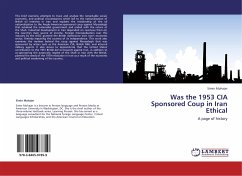This brief overview attempts to trace and analyze the remarkable social, economic, and political circumstances which led to the nationalization of British oil interests in Iran and explains the relationship of the oil nationalization to the Anglo-American-sponsored coup against Mossadegh that subdued the nationalist government and ended with the return of the Shah. Industrial development in Iran depended on revenues from oil, the country's main source of income. Foreign monopolization over this industry by the AIOC granted the British dominance over Iran's economic sector, thereby impairing the country of its independence. This work also examines the motives behind the coup against Mossadegh that was sponsored by actors such as the American CIA, British MI6, and internal military agents. It also strives to demonstrate that the United States' contribution to the 1951 British-led oil boycott against Iran, in addition to co-sponsoring the autocratic regime of the Shah in Iran with the British, planted the seeds of the 1979 revolution in Iran as a result of the economic and political weakening of the country.
Bitte wählen Sie Ihr Anliegen aus.
Rechnungen
Retourenschein anfordern
Bestellstatus
Storno





![The Role of Follow-on Contracts in Government-sponsored Research and Development [by] Edward B. Roberts and William H. Dyer The Role of Follow-on Contracts in Government-sponsored Research and Development [by] Edward B. Roberts and William H. Dyer](https://bilder.buecher.de/produkte/65/65277/65277442m.jpg)


